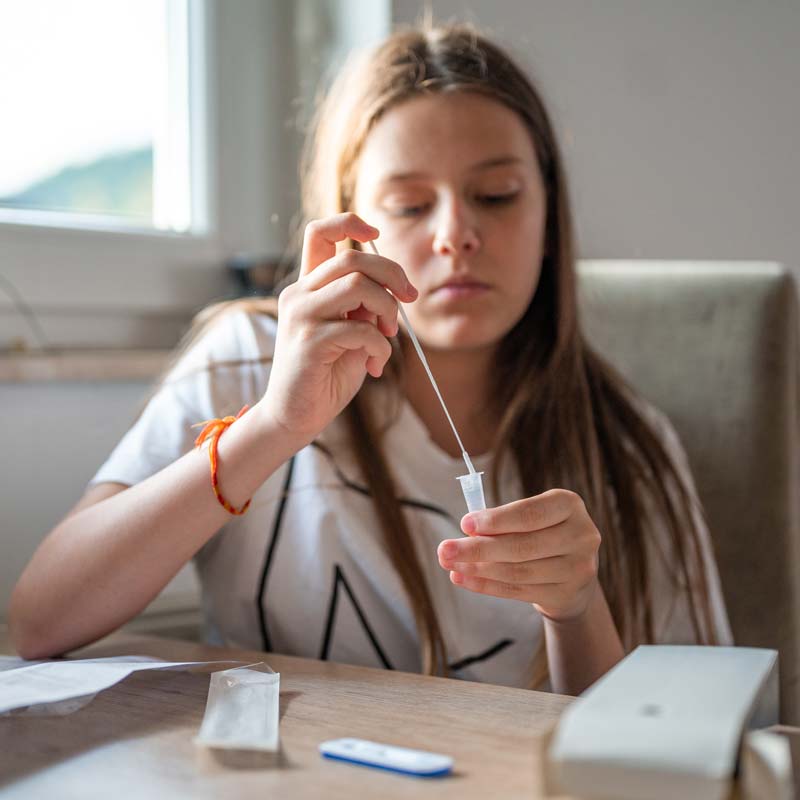How To Register for COVID-19 Testing at your School
The integration of testing in schools is new for many, Safely Opening Schools is available for ongoing support and sharing best practices learned from the SOS pilot.
Your School is now a Laboratory
California School K-12 Antigen Testing Program
Through the 2021-2022 school year, the California Department of Public Health supported schools by implementing a robust testing program to reduce community transmission in schools. Over 800 schools districts across the State of California were eligible to receive support from the state to implement testing if they met the following criteria: rurality, size of student population, access to free and reduced lunch, vaccination rate among 5-17 year olds, community vulnerability in reference to the Healthy Places Index, and the CDC’s Social Vulnerability Index. Through the K-12 School Antigen Testing Program, school administrators were given the option to take direct funding to stand up their own testing program by employing testing administrators or opt into the End-to-End Services program. Through the End-to-End Services program, schools were assigned a testing vendor to provide testing services at their schools to include: students and staff.
Additional Resources
Use our Rise Online-Training Platform Rise is an online training platform that outlines the CDPH Playbook, as well as a series of simple and accessible lessons for people who are being trained to implement rapid testing. Rise can also allow a site administrator track who has completed their training. Contact [email protected] to get access on the Rise Platform.
Video Trainings Available Online
- Abbot BinaxNOW Training modules 1 – 4 (11 minutes)
- Training for reading equivocal tests for all participants who will be reading or registering test results (8 minutes)
- HIPAA training (15 minutes) – only for those without certification for screening and test administrators who do not have a HIPAA certificate, you can receive one online after going through the online training course. There are a number of resources for HIPAA Training, for example this training with Accountable.
- Donning PPE (4 minutes)
- Doffing PPE (4 minutes)
Other key training materials
- California Department of Public Health K-12 School Rapid Testing Program’s Playbook. This is a comprehensive guide to most information for rapid antigen testing. It walks the reader through all key information on what is needed for a testing program. This guide is most useful for school district or school screening program coordinators overseeing the entire process
- Training Powerpoint: covers basic issues on the test, roles in the screening process, test interpretation and use of PCR. Some information is specific to the Primary data platform.
- Primary Learning Guide: covers basic steps for using the Primary data platform
- Material for laminated cards for tabletop use
- Guide to reading BinaxNOW tests
- Self-Swab instructions
- Test time calculator
- Algorithm for when follow-up PCR is needed
- AbbottBinaxNOW Notice of Extension of expiration dates for test kit lots
- Quality Control Log for BinaxNOW testing. Sites are required to perform the quality control tests once for each new shipment or lot received (not each box). Results should be logged.
- Training Log: sites should keep careful records of training of staff implementing rapid antigen testing.
While most California schools will use the statewide CLIA waiver available from the California Department of Public Health, if for some reason you cannot or wish to have your own waiver, you will need to follow the steps below:
- Identify a physician or clinical laboratory director who will act as your CLIA Director.
- Complete and submit the paperwork. Forms are all available on the CDPH website here. They are submitted as uploaded attachments to the online application. You will need:
- The new online waiver application
- The Federal CMS 116 completed by the CLIA Director
- The state LAB 183 form an attestation completed by the CLIA Director and the
- The state LAB182 attestation completed by the organization that will be testing.
- A full list of the sites where you plan to do the testing
- Pay the fees
- The state fee to submit the CLIA application is $113 payable plus $26 per testing site payable to CDPH at the time of application.
- The Federal fee is approximately $150 and will be invoiced later.
- Note: The site can start testing once the waiver request is submitted!
- Issue a standing order for testing: Have your CLIA Director or another physician issue a standing order for testing with the selected test at your institution. See an example here.
- California recommendations
- State of California Safe Schools for All Plan
- California Department of Education chart outlines sources of funding that can cover COVID-19 testing activities including rapid antigen testing.
National reports
- CDC school guidance
- Rockefeller Foundation’s Taking Back Control: A Resetting of America’s Response to COVID-19
- FDA list of approved diagnostics for COVID-19
Scientific articles
- Read about the science of BinaxNOW. For purposes of preventing transmission in schools, the most relevant comparison is looking at the sensitivity and specificity in relation to PCR tests. These indicate tests with a high level of the virus and the likelihood that the individual tested is infectious.
- Read about a strategy for containment in Rethinking Covid-19 Test Sensitivity (Harvard)
- Read about field performance and public health response using BinaxNOW (UCSF)
- Read about performance characteristics of rapid antigen detection at a public plaza testing site in San Francisco (UCSF)
- Read this evaluation of Abbott BinaxNOW Rapid Antigen Test at two community-based testing sites in Pima County, Arizona (CDC)
- Read about the analytical sensitivity of the Abbott BinaxNOW card (University of Washington)
- Learn more about the performance characteristics of BinaxNOW in this report about Screening Asymptomatic Individuals in a University Setting (University of Utah)


